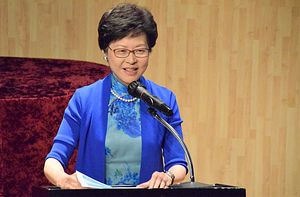With a little over a month before taking office as the next, and first female, chief executive of Hong Kong, Carrie Lam Cheng Yuet-ngor is finding it difficult fill her cabinet.
The chief executive-elect has yet to find the next secretary for justice and secretary for finance posts, arguably the two most prominent roles, and has so far made internal promotions for other ministerial posts, keeping the familiar guard of incumbent civil servants, despite her campaign promise of filling her cabinet with fresh blood
Her task has not been made easier by Beijing, which despite the “one country, two systems” framework must approve her ministerial selections. According to the South China Morning Post, Chinese officials have allegedly stipulated that the new administration be filled only with candidates who are deemed “trustworthy” (by Beijing) and have proactively made efforts to communicate with mainland Chinese officials.
Speaking to local radio network RTHK, Lam said, “Of course I would like the best, but there are many considerations before people decide to enter politics.” She added, “There will be a lot of scrutiny of ministers. There are many issues to consider too, issues such as democracy.”
In a city with a long and illustrious parliamentary history, the prospect of working for Hong Kong’s executive government administration has lost its sheen. With the collision of an increasingly politicized population, and a China seemingly intent on suppressing Hong Kong identity, intense pressure and criticism is guaranteed in a job as a government minister.
Lam has been working hard to persuade incumbent Secretary for Justice Rimsky Yuen Kwok-keung to stay, although it is understood Yuen is determined to go back to private practice as a barrister.
Yuen has had one of the toughest jobs under current Chief Executive CY Leung’s government, often being tasked with defending the Hong Kong government’s decisions, which are increasingly viewed as China’s mandates. As a result, Yuen has often played the role of punching bag, absorbing much of the population’s disdain toward the Leung administration’s decisions on issues such as the interpretation of Hong Kong’s Basic Law by China’s top legislative body late last year, which raised concerns in the legal profession about interference in the city’s autonomy.
The next justice secretary will need to be prepared to handle the onslaught of directives from Beijing that will ultimately be unpopular with the citizens of Hong Kong. According to the South China Morning Post, the first item on the agenda is the ever-creeping Chinese jurisdictional impingement into Hong Kong side of the border at the high-speed railway station, which will connect China and Hong Kong
Lam is also finding it difficult to convince members from the city’s business community to join her as the new secretary of finance. The role is currently occupied by Paul Chan Mo-po, who was hand picked by Leung when the previous finance secretary turned chief executive contender, John Tsang Chun-wah stepped down. Tsang was the popular favorite in the race for Hong Kong’s top post but ultimately lost to Lam in the closed-circle election. It is increasingly likely that Chan will continue as secretary for finance.

































